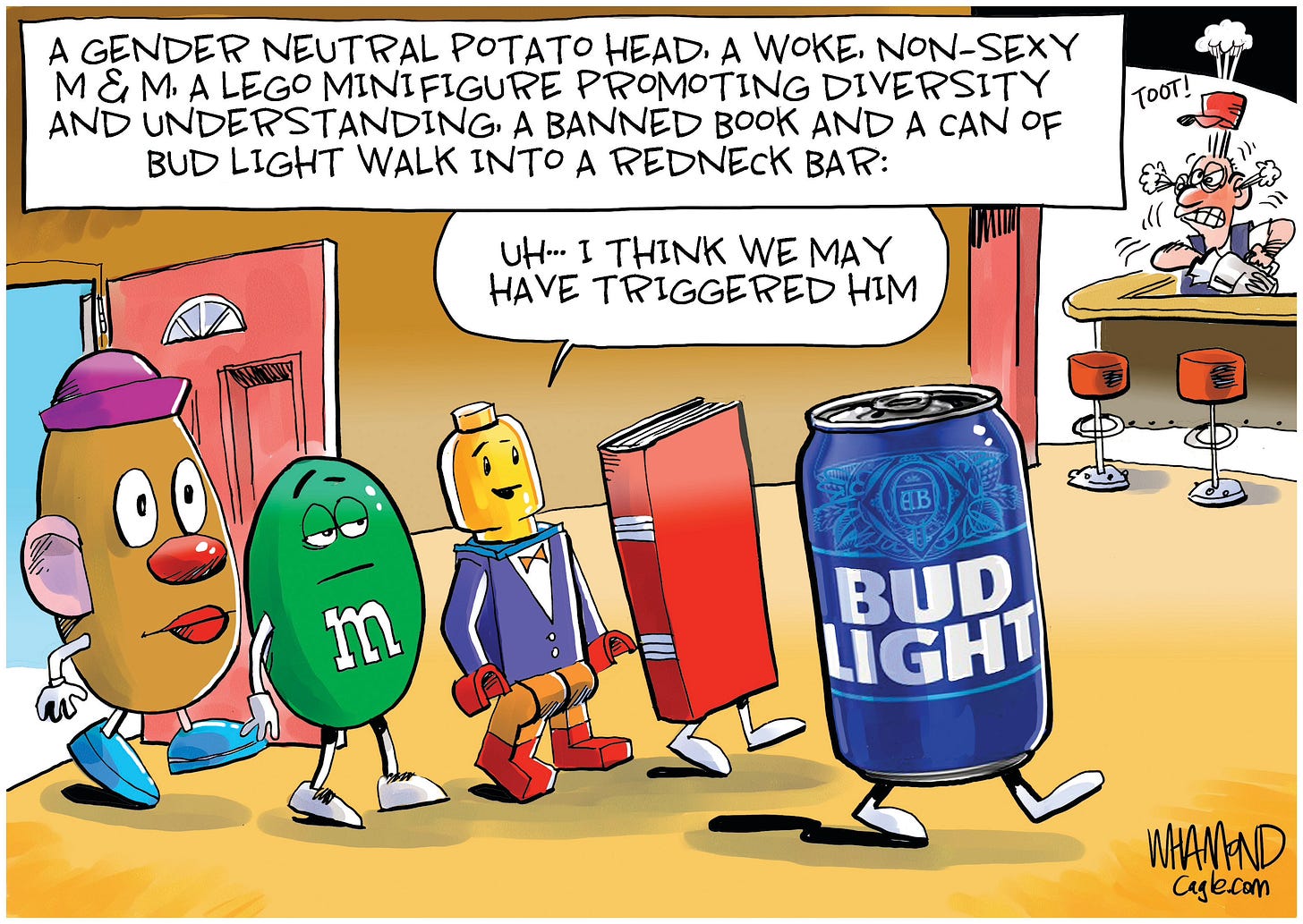The most refreshing beer I ever drank was an ice cold Bud Light after two pals and I got back from a trip up and down Little Devils Tower in the Black Hills. My favorite hike, two stalwart pals: no beer has ever tasted colder or better.
At that time, and until earlier this year, Bud Light was the most popular beer in the land, the No. 1 best seller. But then … but then …
Then, last spring, Bud Light sent a commemorative Bud Light can to transgender influencer Dylan Mulvaney, who promptly posted it on social media where she has millions of followers.
But many conservative Americans, egged on by influencers of their own, did not want to be drinking with Mulvaney – even at a distance, even figuratively.
“Fraud!” cried the maddened thousands, and echo answered, “fraud.”
How dare their favorite beer reach out to include people not exactly like them at the party?
Outrage! Acknowledging the existence of “others” puts one on a slippery slope of ensuring them of rights equal to the majority. Some folks just have to have somebody to bully.
Boycott! Make those brewers pay for their open-minded inclusiveness.
And it worked.
Anheuser-Busch Inbev, the parent company of Bud Light, reported a revenue drop of 10.5% in the second quarter this year, “primarily due to the volume decline of Bud Light.”
I don’t agree with the motivation. Bigotry is evidence of ignorance, a denial of the multitudinous variations in the human condition, where all of us are cousins at one remove or another.
Also, logic tells us that all of those “others” must be created in the image of someone among that heavenly “us” addressed in Genesis.
But I have no problem with their tactic. We have a right to spend our money how and where we choose.
In fact, I once triggered a beer-related boycott. When Coors introduced Coors Light, I made what I thought was the obvious observation that Coors had been calling itself “America’s Fine Light Beer” for years. [I still have a metal tray thus embellished.] I wondered how much lighter it could get.
The local Coors distributor, who had placed a full-page newspaper ad announcing the new brew, was not pleased. He pulled his ads.
Good liberals boycotted grapes to support striking California farm workers.
As a long-time magnet for poor service, I am a practitioner of the principle of directing my feet away from such indifference.
One car mechanic once found “catastrophic” shock damage. A second opinion found none. Another establishment now off-limits.
I have been eating Butterfingers again – a favorite candy bar of my youth, two wrappers of which helped secure me my Tales of the Texas Rangers badge. Butterfingers had been taboo since I discovered that Swiss conglomerate Nestlé had bought its rights.
I boycott Nestle products – and have since I learned in the late ‘70s or early ‘80s about its dangerous marketing scheme to sell baby formula in third world countries. The company boosted its sales by promoting its formula as the “modern” way for mothers to feed their babies.
Breastfeeding was called a sign of backwardness. No matter that many targeted areas had no stable supplies of clean water; salespeople, some dressed as nurses, pushed the sales and sickened and killed thousands of babies. I haven’t knowingly had a Nestlé product since. [Later, Nestlé abandoned those tactics and instituted safeguards for the future.]
Well, I certainly put them out of business.
But that goal is somewhat elusive – unless you have been duped by warmongers into boycotting The [Dixie] Chicks after swallowing the Bush/Cheney/Rice lies that led us to destroy and destabilize Iraq.
Corporations, too, are image conscious. When X owner Elon Musk endorsed an anti-Semitic post by a conspiracy idiot on his social network, Apple and Disney were quick to pull their advertising money from his platform instead of risking guilt by association.
The principle is personal responsibility. Our actions define us. Which checkout lines we choose to stand in – are you self-checkers getting your employee discounts? – can reveal where we stand on matters of politics, community or culture.







Good to know that I’m not the only individual who quietly boycotts businesses or products because of something with which I don’t agree. Sometimes we boycott as a family. Sometimes as individuals. But if I know a close family member is boycotting someone or something, I don’t cross their line. Keep up your moral/ethical stands!